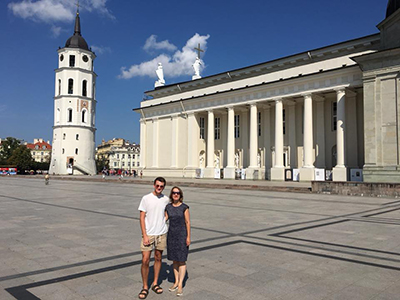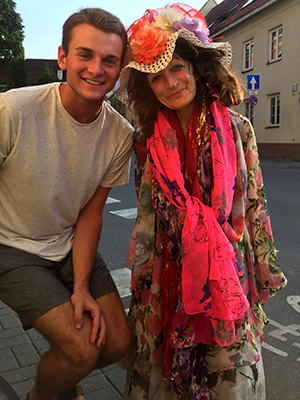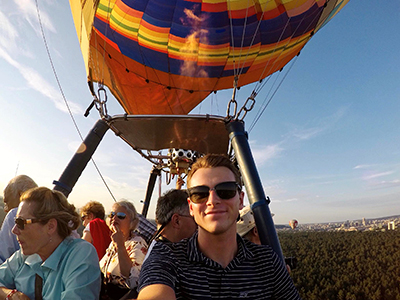
- junior Anthropology and Finance double major
- minor in French
- from Youngstown, OH
- Undergraduate Summer Scholar research on LGBTQ "coming out" experiences in Latvia and Lithuania (2018)
- traveled to 17 different countries in a single summer
"Get out there, experience research and all the things you're learning about, and put them to good use. I promise it will be the most rewarding aspect of your undergraduate career here at Miami. And getting to know your professors is the best way to facilitate relationships that give you opportunities to do things like research and internships and so on."
Why Miami?
"Coming from northeast Ohio, I was looking at schools not only all over the state but also the east coast, and Miami was the last one I toured. I had some friends who told me I would be a great fit here, and as soon as I got onto campus I knew — I said to my mom, 'Wow, this place is spectacular.' It was a beautiful spring day, and students were walking around, and someone said hello to me. I just got that gut feeling, like when you visit a new country and are getting off the plane, and you just know you're going to love the place. This was how I felt when I first visited Miami.
"First semester freshman year was probably one of the best times of my life. Being independent in a new environment, feeling your first taste of freedom and learning to behave like an adult. And with that comes a ton of responsibility. It was a huge transformative time in my life, where I met different people from all walks of life and built some lasting friendships.
"I started as a biology and pre-med student — when I was 10 I had a toy doctor's kit and practiced on my grandma! I always had this romanticized vision that I would go to school, become a doctor and have a massive home and wonderful things by the time I was 38. But when I got to Miami to sit down for my biology classes, the professors were great, but the material was just not for me. That first semester I called my parents and said, 'I know this has been my dream all my life, but it's changing.' And by the end of my first semester I figured it was time to choose something else — and my second semester, I discovered anthropology!"
Best Miami Experiences

Dante Rossi and Neringa Klumbyte in front of Cathedral Basilica of St Stanislaus and St Ladislaus of Vilnius, Lithuania.
"The first anthropology class I took was a Miami Plan course called Ancient Cultures and Civilizations [ATH 145] with assistant teaching professor Jeb Card. I liked it so much that I took two more cultural anthropology courses in the summer before my sophomore year. And after those, I declared anthropology as a minor and signed up for more courses for the following fall. One was a linguistics course taught by associate professor Leighton Peterson, and I knew then that anthropology is where my heart is.
"Anthropology is so interesting to me because you get to compare various languages and cultures. I also love to travel and explore the world, so it's been the perfect fit for me. Dr. Peterson is one of those people who I can visit during office hours and have a conversation. Additionally, my sophomore year I took a couple classes with associate professor Neringa Klumbyte and then did a research project with her last summer in Lithuania, which is her birthplace.
"Last year I took the Havighurst Colloquium [ATH 436], which sparked my interest in Russian studies, particularly the Eastern, Post-Soviet bloc, so that was partially what interested me in doing research with Dr. Klumbyte in Lithuania. She took me around the country, helped me with the language, and really tried to get me to work as hard as I could to get the best results from my field work.
"My likely career path after graduation will be something in the financial sector or consulting. Anthropology is important and relevant to this because the whole discipline shows you how to get to the core of information — what does it really mean, how do we condense it down, what can we deduce from all these field notes and participant observations. Additionally, anthropology is just something that has opened my mind like no other. As humans, we all have certain biases and judgments, and anthropology teaches you that all cultures are equally developed, that people are people, and that we have so many more similarities than differences. In the global world, everything must become more centered on diversity and working together as a team. That is something that anthropology teaches us."
Miami and the Liberal Arts

Dante Rossi and Rose, well known for her outfits, Vilnius, Lithuania
"The Miami Plan courses are one of the best things Miami requires. Some students, especially those going into medicine or law or business, may wonder why they're taking a comparative religion or philosophy course. But there is so much more to life than what you do as a profession. Get to know people as who they are, get to know their religions and cultures — that is so much more invigorating and rewarding at the end of the day.
"My favorite courses at Miami have not just been for anthropology majors, but also for political science, Russian studies, prelaw, and anyone who had an interest. And I think the best part about Miami's liberal arts education is that it has encouraged me to explore different facets of things that I never thought I would be interested in. Anthropology has now become my major and one of my biggest passions.
"What really caught my eye in anthropology is the notion of field work, actually living for an extended period of time in a different culture or country. It's fascinating that you can be uprooted from your normal 9-5 workday life and go spend a year living with a tribe in Papua New Guinea, trying to assimilate and understand how they live. I think that is something that most other disciplines seem to lack."
Gay Rights in the Shadow of the Former Soviet Union
"For about three weeks last summer, I did an Undergraduate Summer Scholar project in Latvia and Lithuania, where I conducted interviews for field research on LGBTQ "coming out" experiences. The idea started when I took Dr. Peterson's Introduction to Linguistic Anthropology course [ATH 265] and worked on a research project for our final. I interviewed five gay Miami students, which was particularly interesting because it really hit home in some aspects.
"Later, in Dr. Klumbyte's ATH 436 class, she told us about a scholarship opportunity to do research anywhere in the world, and I saw the perfect opportunity to continue my previous research. Gay marriage is legal here in the U.S., and we have laws that prohibit discrimination, and I felt it would be interesting to go to a part of the world where these things don't necessarily exist. Dr. Klumbyte does research in Lithuania every summer, so it was a really unique opportunity for me to go as well.

Dante Rossi selfie in hot air balloon over Vilnius, Lithuania
"The former Soviet Union has played a large part of Lithuania's history, with ideologies characterized as a violation of human rights and the suppression of identities. At the time, if your ideologies varied from the government's, you could get in a lot of trouble — some people were imprisoned or even killed. I tried to approach this project in that context to see how the Soviet Union had shaped the ideologies of the Lithuanian people. It's part of the reason why LGBTQ rights are still not a big topic in that region.
"I went into the project not knowing who I was going to interview, but once you start building relationships with people, it opens so many doors. I talked to people from 18 to roughly 50 years old — therefore, some who had never lived during the tense Soviet times and some who were subjected to harsh punishments for being homosexual or had to suppress their sexual identity. There isn't a very big LGBTQ community in Lithuania and Latvia, so I found most of my research participants through word of mouth.
"In Vilnius, Lithuania there is an LBGTQ center called the Lithuania Gay League (LGL), and I interviewed the director and some of the volunteers. They explained how they deal with policies about gay rights and have seen huge milestones for their country in recent years. Although homosexuality was decriminalized there in the early 90s, there are anti-propaganda laws, modeled after some in Russia, that focus on LGBTQ relationships and behaviors. One is the Law for the Protection of Minors, in which homosexual relations are considered a potential threat to the formation of ideologies and beliefs of Lithuanian children. It may not be completely illegal to be gay, but you do have to suppress your identity.
"Coming out stories in the U.S. usually follow a pattern, which usually starts with realizing and accepting that you're gay. You then go and tell one of your closest friends, and then you tell your family. It usually starts with 'I love you, but this is who I am.' This elicits a reaction from your family and friends, and you keep telling more people. That's your typical American coming out story.
"As an anthropology student, however, I understand that many things are culture-specific, and not everyone in the world has similar experiences. It became all the clearer in Lithuania, where I conducted 9 interviews, each roughly an hour long. People there didn't believe that being gay was an integral part of their identity but more something private and personal. Many of my interviewees revealed that their parents, work colleagues, and friends simply didn't know.
"Ultimately, I concluded that coming out stories are not an integral part of being gay in the Baltic region. In America we have such a large and visible LGBTQ community, with many resources and people to talk to, but those resources barely exist in Lithuania and Latvia. There really are no coming out stories there, at least among those who I interviewed, and this realization reinforced to me the philosophy that everything is culturally specific.
"Transcribing and examining all that data to turn it into a thesis was a great, powerful experience that will be hugely valuable for me when I'm in the professional world. On top of that, I learned to understand people for who they are, which I think is much more important in our professional and personal lives. Many of us tend to forget to live — just focused on getting into a university, getting that internship, getting a nice big job, and working our lives away without enjoying meaningful human connections. At the end of the day we are all people. If we can get to know one another, it would be applicable to literally every aspect of life."
Advice to Students
"My advice has two parts. For anthropology majors, I say to get out there, experience research and all the things you're learning about, and put them to good use. I promise it will be the most rewarding aspect of your undergraduate career here at Miami. And getting to know your professors is the best way to facilitate relationships that give you opportunities to do things like research and internships and so on.
"For Miami students in general, I ask them to suspend their bias and preconceived notions about college life and social experiences and just get know people for who they are. Accepting others' differences is one of the most beautiful things in the world. We are all so different and unique, and getting to know people through that will make your life so much more wholesome.
"Finally, just be yourself. There's nothing better in life than accepting and loving who you are!"
[April 2019]
 Miami University Oxford, Ohio est. 1809
College of Arts and Science
Miami University Oxford, Ohio est. 1809
College of Arts and Science
 Miami University Oxford, Ohio est. 1809
College of Arts and Science
Miami University Oxford, Ohio est. 1809
College of Arts and Science